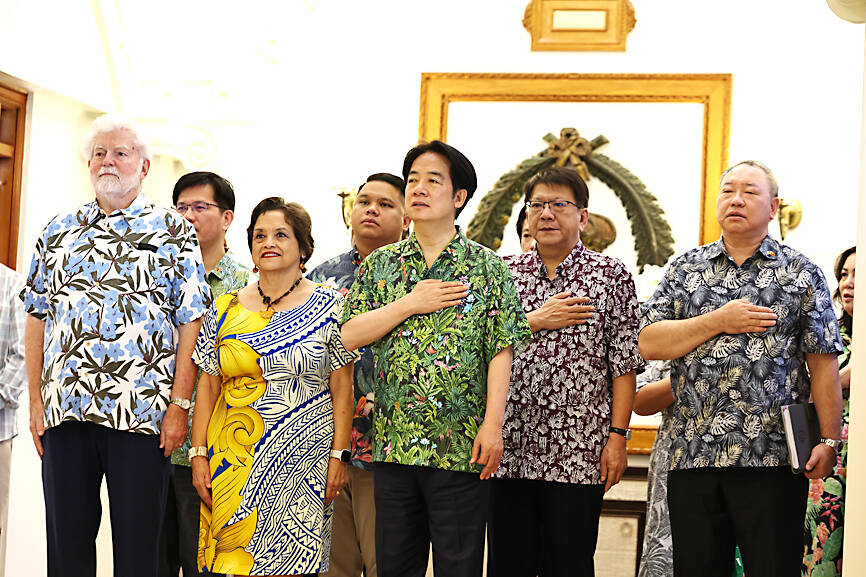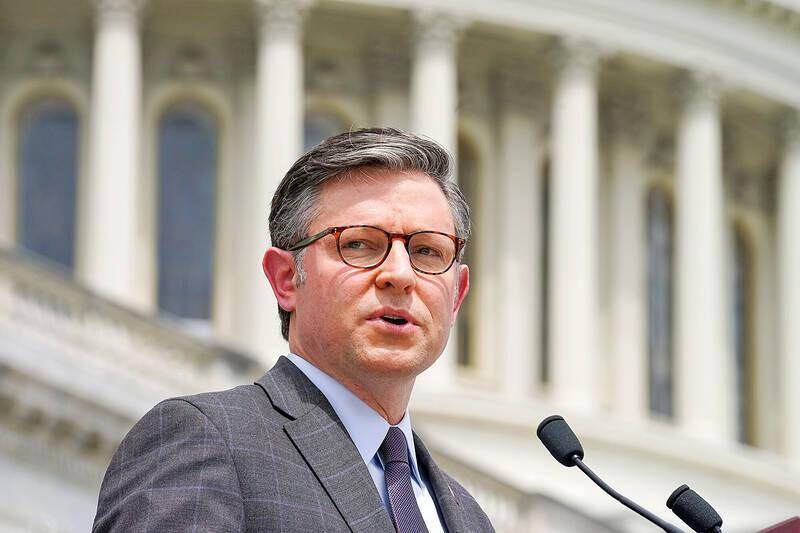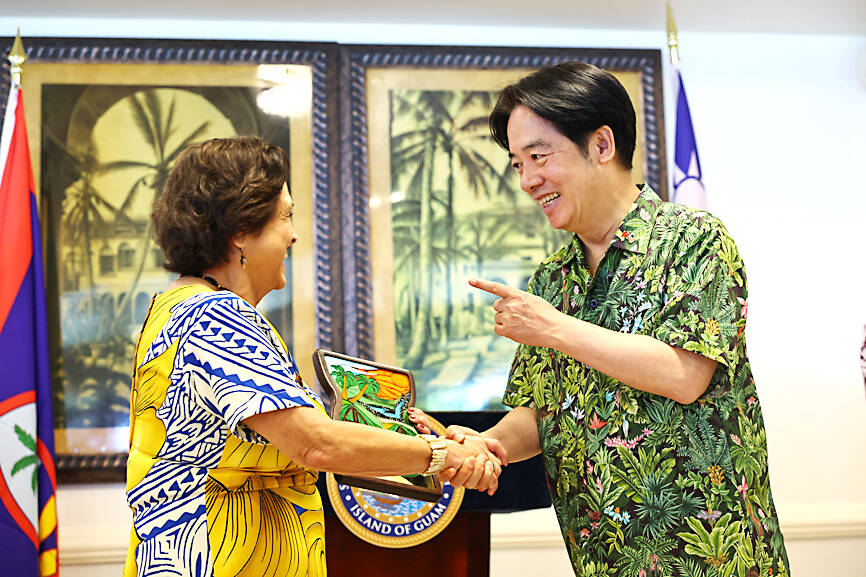US House of Representatives Speaker Mike Johnson said during a telephone call with President William Lai (賴清德) yesterday morning that recognition of Taiwan is at the core of the US’ Indo-Pacific strategy, Presidential Office spokesperson Karen Kuo (郭雅慧) said.
The call marked the first time Lai had spoken directly with Johnson, of the Republican Party, since taking office in May.
Lai also had a call with US House Minority Leader Hakeem Jeffries of the Democratic Party and a videoconference with Republican Senator Roger Wicker while in Guam, during a stopover on his way back from visiting the nation’s allies in the Pacific, Kuo said.

Photo: CNA
The US representatives emphasized the bipartisan congressional support to help Taiwan preserve its democracy and freedom, and to continue strengthening relations between the US and Taiwan, Kuo said.
Johnson said that the US Congress continues to pass bills to strengthen Washington’s response to China and its capacity to help Taiwan enhance its defense capabilities.
The speaker also mentioned Congress’ wariness of challenges and threats posed by China, and its recognition of Taiwan as being at the core of the US Indo-Pacific strategy, Kuo said.

Photo: Bloomberg
Lai told Wicker that Taiwan would not cower in the face of increasing threats and that his government was committed to boosting Taiwan’s defense capabilities and economic resilience, Kuo said.
The president expressed hope that both sides would further collaborate on national defense, she said.
Kuo also cited Wicker as saying that he was pleased to see Taiwan’s commitment to self-defense and that he would continue to support Taiwan’s security after taking up the chairmanship of the US Senate Committee on Armed Services next year.

Photo: CNA
Wicker is currently a ranking member of the committee.
Lai arrived in Guam on Wednesday evening after wrapping up a short visit to Taiwan’s Pacific ally Tuvalu.
Yesterday morning, Lai visited the legislature of Guam, making him the first Taiwanese president to visit the lawmaking body of the unincorporated US territory, a Presidential Office source said.
“Today, we gather to honor the enduring relationship between Guam and Taiwan built on decades of partnership and shared values,” Guamanian Legislative Speaker Therese M Terlaje said before presenting a copy of a resolution to Lai.
The resolution, passed by the legislature, welcomes “President Lai Ching-te [William]” and extends “our appreciation for Taiwan’s significant contributions to Guam’s economy and community.”
The “deep cultural, educational, health and economic connections ... have greatly benefited our islands,” Terlaje added.
Lai compared Taiwan and Guam to “family members,” citing the deep cultural connections between the two sides and their shared values of democracy, freedom and human rights.
“Moving forward, let us continue to work together to deepen cooperation between Taiwan and Guam,” jointly becoming a crucial force in defending freedom and democracy in the Indo-Pacific region, he said.
Lai, accompanied by Presidential Office and Cabinet officials, headed to Palau — the final destination of his South Pacific tour that has included stops in the US state of Hawaii and the Marshall Islands — yesterday afternoon.
He is to conclude his first overseas trip as president today.
While stopping over in Hawaii on Sunday, the president also had a 20-minute phone call with former US House speaker Nancy Pelosi, who visited Taiwan in 2022 when she was still speaker.

Right-wing political scientist Laura Fernandez on Sunday won Costa Rica’s presidential election by a landslide, after promising to crack down on rising violence linked to the cocaine trade. Fernandez’s nearest rival, economist Alvaro Ramos, conceded defeat as results showed the ruling party far exceeding the threshold of 40 percent needed to avoid a runoff. With 94 percent of polling stations counted, the political heir of outgoing Costa Rican President Rodrigo Chaves had captured 48.3 percent of the vote compared with Ramos’ 33.4 percent, the Supreme Electoral Tribunal said. As soon as the first results were announced, members of Fernandez’s Sovereign People’s Party

EMERGING FIELDS: The Chinese president said that the two countries would explore cooperation in green technology, the digital economy and artificial intelligence Chinese President Xi Jinping (習近平) yesterday called for an “equal and orderly multipolar world” in the face of “unilateral bullying,” in an apparent jab at the US. Xi was speaking during talks in Beijing with Uruguayan President Yamandu Orsi, the first South American leader to visit China since US special forces captured then-Venezuelan president Nicolas Maduro last month — an operation that Beijing condemned as a violation of sovereignty. Orsi follows a slew of leaders to have visited China seeking to boost ties with the world’s second-largest economy to hedge against US President Donald Trump’s increasingly unpredictable administration. “The international situation is fraught

MORE RESPONSIBILITY: Draftees would be expected to fight alongside professional soldiers, likely requiring the transformation of some training brigades into combat units The armed forces are to start incorporating new conscripts into combined arms brigades this year to enhance combat readiness, the Executive Yuan’s latest policy report said. The new policy would affect Taiwanese men entering the military for their compulsory service, which was extended to one year under reforms by then-president Tsai Ing-wen (蔡英文) in 2022. The conscripts would be trained to operate machine guns, uncrewed aerial vehicles, anti-tank guided missile launchers and Stinger air defense systems, the report said, adding that the basic training would be lengthened to eight weeks. After basic training, conscripts would be sorted into infantry battalions that would take

GROWING AMBITIONS: The scale and tempo of the operations show that the Strait has become the core theater for China to expand its security interests, the report said Chinese military aircraft incursions around Taiwan have surged nearly 15-fold over the past five years, according to a report released yesterday by the Democratic Progressive Party’s (DPP) Department of China Affairs. Sorties in the Taiwan Strait were previously irregular, totaling 380 in 2020, but have since evolved into routine operations, the report showed. “This demonstrates that the Taiwan Strait has become both the starting point and testing ground for Beijing’s expansionist ambitions,” it said. Driven by military expansionism, China is systematically pursuing actions aimed at altering the regional “status quo,” the department said, adding that Taiwan represents the most critical link in China’s